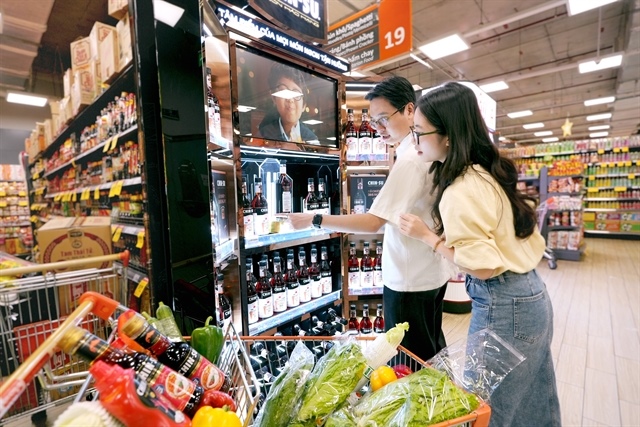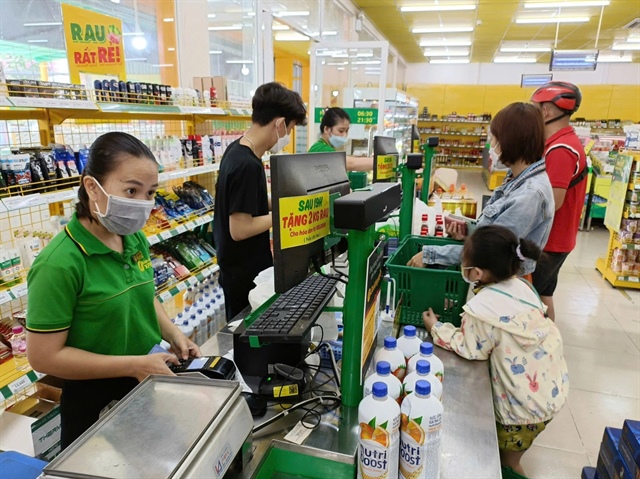Kinh Do looks to noodles as Vietnam growth slows
Kinh Do looks to noodles as Vietnam growth slows
Kinh Do Corp., Vietnam’s biggest listed confectionery maker, may expand into noodles, cooking oils and sauces within three years as it seeks new products to weather slowing economic growth.
“Our existing products are still somewhat seasonal in that we sell a lot during the holidays and a lot less during the regular time of year,” Chief Financial Officer Kelly Wong said in an interview at a Kinh Do office in Ho Chi Minh City. “We want to sell products that people eat more regularly.”
Having a wider range of food items would help Kinh Do maximize its nationwide distribution network for economies of scale throughout the year, Wong said. Vietnam’s gross domestic product growth last year was the lowest since 1999, according to International Monetary Fund data, while the nation’s retail sales through September increased at the slowest pace since at least 2005.
“Kinh Do has a very strong local brand that is well-recognized throughout the country, and that helps them launch new products at a cheaper cost than companies that have to spend heavily on marketing,” said Michel Tosto, head of institutional sales and brokerage at Viet Capital Securities in Ho Chi Minh City. “If they can successful leverage their brand to go into new products, it would probably be seen in the market as positive.”
Shares of the Ho Chi Minh City-based Kinh Do were unchanged today. The stock has advanced 28 percent this year, compared with a 20 percent gain for the nation’s benchmark VN Index.
Slowing economy
Vietnam’s annual economic growth averaged 7.4 percent from 1990 to 1999, slowed to 6.9 percent in the next decade, and eased further to 6 percent since 2010, according to the IMF. GDP will probably expand 5.3 percent this year and 5.4 percent in 2014, IMF data show.
The economic slowdown “makes us work a lot harder,” Wong said Oct. 10. “But it also forces us to look forward much further, in the sense of what other categories do we need to include in order to maintain a steady growth or have a sustainable business.”
Revenue at Kinh Do rose 1 percent to 4.29 trillion dong ($203 million) and net income climbed 28 percent to 354 billion dong last year, according to its annual report. Biscuits were the largest sales contributor, accounting for 26 percent, followed by cakes at 18 percent, mooncakes at 17 percent, ice cream at 14 percent and buns at 12 percent, Kinh Do said in May.
“The newer products we talk about -- noodles, oils, sauces -- are products that people would consume on a daily basis,” Wong said. “It’s about us as a company having products that are higher penetration.”
‘Serious threat’
Competition in Vietnam’s food industry will probably increase as the government negotiates to enter trade accords such as the Trans-Pacific Partnership with nations including Japan and the U.S.
Multinational competitors are “a serious threat,” the CFO said. “It’s hard to ignore a 90 million-person market.”
Once the trade pact accord takes effect, the duty rate for imported food products that compete with Kinh Do’s will probably drop, said Fred Burke, managing director of Baker & McKenzie (Vietnam) Ltd. in Ho Chi Minh City.
Foreign companies will enjoy greater market access because the licensing process, now onerous for them, should become less cumbersome after the accord, Burke said.
Among Kinh Do’s competitors in new businesses would include Masan Group Corp., a saucemaker, and the Vietnamese unit of Japan’sAcecook Co., which produces noodles. Kinh Do won’t target the top market position for these businesses, Wong said.
Comfortable spot
“It’s too expensive to really go at it with existing market leaders,” he said. “Our goal is really to carve out a nice, comfortable number three or four spot, to get into a category where we can scale up quickly.”
While the company would leverage its own networks in Vietnam for distribution, some production may be outsourced to countries such as Malaysia or Indonesia, according to Wong.
Kinh Do also has some property investments which it wants to exit entirely, a process that may take a few more years, Wong said. The company’s move to focus on its core food operations has helped its share price and standing with investors, according to Viet Capital’s Tosto.
“There’s the opportunity cost of that much money sitting in something that doesn’t return,” Wong said. “We’ve learned our lesson. The focus is the food business.”
bloomberg




























